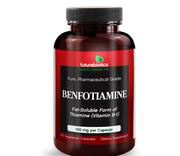German Scientists Find That Drugs That Inhibit The Metabolic Pentose Phosphate Pathway Such As Benfooxythiamine Could Serve To Treat COVID-19
Source: COVID-19 Drugs Oct 31, 2021 3 years, 5 months, 3 weeks, 5 days, 5 hours, 28 minutes ago
COVID-19 Drugs: A new study by German researchers from the Goethe University, Fraunhofer Institute for Translational Medicine and Pharmacology (ITMP), Hannover Medical School, German Lung Research Center (DZL) and the German Center for Infection Research (DZIF), along with support by experts from University of Copenhagen-Denmark and the University of Kent-UK has found that drugs that target the metabolic pentose phosphate path way such as Benfooxythiamine could be used to treat COVID-19 as they inhibit the replication of the SARS-CoV-2 coronavirus.

The SARS-CoV-2 coronavirus and its emerging variants/sub-variants are continuing to wreak havoc globally ad there is an urgent need for effective pharmacological solutions including antivirals.
It has been found that the SARS-CoV-2 virus induces a shift of the host cell metabolism towards glycolysis, and the glycolysis inhibitor 2-deoxy-d-glucose (2DG), which interferes with SARS-CoV-2 infection, is under development for the treatment of COVID-19 patients.
The glycolytic pathway generates intermediates that supply the non-oxidative branch of the pentose phosphate pathway (PPP).
The detailed analysis of proteomics data indicated increased transketolase (TKT) levels in SARS-CoV-2-infected cells, suggesting that a role is played by the non-oxidative PPP.
In agreement, the TKT inhibitor benfooxythiamine (BOT) inhibited SARS-CoV-2 replication and increased the anti-SARS-CoV-2 activity of 2DG.
The study findings conclude that SARS-CoV-2 infections are associated with changes in the regulation of the PPP. The TKT inhibitor BOT inhibited SARS-CoV-2 replication and increased the activity of the glycolysis inhibitor 2DG. Notably, metabolic drugs like BOT and 2DG may also interfere with COVID-19-associated immunopathology by modifying the metabolism of immune cells in addition to inhibiting SARS-CoV-2 replication. Hence, they may improve COVID-19 therapy outcomes by exerting antiviral and immunomodulatory effects.
The study findings were published in the peer reviewed journal: Metabolites.
https://www.mdpi.com/2218-1989/11/10/699
The German study team have identified a potential new treatment that suppresses the replication of SARS-CoV-2, the coronavirus that causes Covid-19.
It is already known that in order to multiply, all viruses, including coronaviruses, infect cells and reprogramme them to produce novel viruses.
The
COVID-19 Drugs study findings revealed that cells infected with SARS-CoV-2 can only produce novel coronaviruses when their metabolic pentose phosphate pathway is activated.
Importantly when applying the drug benfooxythiamine, an inhibitor of this pathway, SARS-CoV-2 replication was suppressed and infected cells did not produce coronaviruses.
The study team also found that the drug benfooxythiamine also increased the antiviral activity of ‘2-deoxy-D-glucose’; a drug which modifies the host cell’s metabolism to reduce virus multiplication.
Hence the stu
dy findings show that pentose phosphate pathway inhibitors like benfooxythiamine are a potential new treatment option for COVID-19, both on their own and in combination with other treatments.
Furthermore, Benfooxythiamin’s antiviral mechanism differs from that of other COVID-19 drugs such as remdesivir and molnupiravir. Therefore, viruses resistant to these may be sensitive to benfooxythiamin.
Co-researcher Dr Martin Michaelis a Professor from the School of Biosciences, University of Kent told Thailand Medical News, “This is a breakthrough in the research of COVID-19 treatment. Since resistance development is a big problem in the treatment of viral diseases, having therapies that use different targets is very important and provides further hope for developing the most effective treatments for COVID-19."
Dr Jindrich Cinatl, a Professor from the Institute for Medical Virology, University Hospital, Goethe University added, “Targeting virus-induced changes in the host cell metabolism is an attractive way to interfere specifically with the virus replication process.”
The study team concluded, “SARS-CoV-2 infection is associated with changes in the regulation of the PPP. The TKT inhibitor BOT inhibited SARS-CoV-2 replication, indicating a role of the non-oxidative PPP branch in the virus replication cycle. Moreover, BOT increased the activity of the glycolysis inhibitor 2DG, which is under development as a drug for the treatment of COVID-19 among other related glycolysis inhibitors. Notably, metabolic drugs like BOT and 2DG may also interfere with COVID-19-associated immunopathology in addition to SARS-CoV-2 replication. Hence, they may improve COVID-19 therapy outcomes by exerting antiviral and immunomodulatory effects.”
For the latest on
COVID-19 Drugs, keep on logging to Thailand Medical News.
